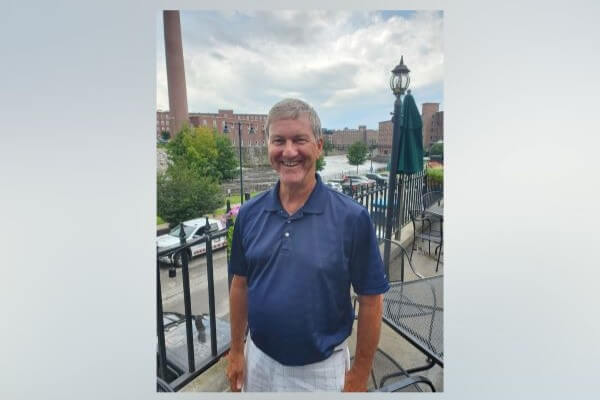Local Spotlight: Craig Pendleton
 |
|
Craig Pendleton PHOTO BY RANDY SEAVER
|
Ever since he was a nine-year-old boy standing on a dock in Camp Ellis, Craig Pendleton has been constantly scanning the horizon, looking for the next opportunity that lies ahead.
Today, Pendleton, 63. lives with his wife Susan in Old Orchard Beach. In April, he announced that he was retiring as Director of Transportation for the Biddeford-Saco-OOB Transit District. Although he is technically retired, he’s still scanning the horizon, wondering if there might be a new opportunity ahead.
Before joining Transit, Pendleton served as executive director of the Biddeford-Saco Chamber of Commerce for several years. He also made an unsuccessful run for the state senate in 2020, but his true passion lies just beyond the beach; on the open waters of the Atlantic Ocean.
The Pendleton family name is well known in the Saco neighborhood of Camp Ellis. His father was one of 11 children and they each had six kids. “Basically, if you threw a rock in Camp Ellis, you would hit a Pendleton,” he laughed during a recent interview.
Pendleton began his career in commercial fishing when he was just nine years old, working on his uncle’s lobster boat during the summer. By the time he was 12, he was earning more money during the summer than his mother earned from her year-round job as a clerk at Percy’s Pharmacy.
From his start as a kid working on a lobster boat, Pendleton eventually became a respected source of information and the proverbial go-to-guy for people like Senator Olympia Snowe, Governor John Baldacci and Senator Angus King when it came time to talk about maritime and commercial fishing issues.
He graduated from Thornton Academy in 1978 and then attended and graduated from the University of Rhode Island, earning a degree in Commercial Fishing and Marine Technology. In 1984, he bought his first vessel: a 75-foot wooden trawler. Less than a year later, he and his two-man crew were rescued by the U.S. Coast Guard when his ship sank approximately 60-miles off the coast near Jeffrey’s Ledge.
You came close to dying on the Atlantic and yet you went back and just kept fishing. Why?
“Well, I did stay home for a month (Laughs) But I had bills to pay and Susan was pregnant. I bought a lobster boat, and we had 800 traps, but I was used to big boats. We rigged it for shrimp in the winter and we got thrashed out there.
“I sold the lobster business and bought a 54-foot steel trawler, the Susan-Caitlyn. Before that, I worked as a captain for Maine Fisheries on a 94-foot trawler.”
When did you make the transition from being a fisherman to being a policy wonk?
“Like everyone else, we were being impacted by ever changing and more restrictive regulations. I didn’t understand who was making the rules. The regulations and new rules just didn’t make sense. So, I started going to meetings and talking to people.
“I had a college degree, actual experience, all of my teeth and I could string together a sentence or two. (Laughs). But seriously, I think people, especially political leaders, liked the fact that I always came with solutions, not just complaints.”
So, the saying that ‘if you’re not at the table, you’re on the menu’ rings pretty true for you?
“Oh, absolutely. We (the fishermen) were getting stomped because we weren’t organized. But trying to organize took away time from sea; so, during every meeting, we were losing money.”
Then you tried an approach that made you somewhat unpopular with other fishermen.
“I quickly determined that we had to work with and not against the environmentalists and the regulators. We had to find common ground and listen to each other. On our side, we had to get organized and be willing to take a collaborative approach.”
That’s about the time that you became one of the leading founders of the Northwest Atlantic Marine Alliance (NAMA)
“Yes. I was inspired by a meeting I had with Dee Hock, the founder of VISA. I had been serving on the credit union board of directors for many years. I intuitively understood how an organized structure could work. It was pretty complicated, but I had enough street credibility to get people involved.
“I liked to write, and we were pretty successful at getting grants. Some people out there couldn’t believe what was happening. They looked at me and said ‘Oh my God! Look! A fisherman with a conservation ethic’ (Laughs), They were tripping over themselves to give us money.”
More than 20 years later, fishing regulations are still pretty punitive toward the industry.
“Yes. Quota systems still create a handful of winners and a whole bunch of losers. Some of the guys were just so angry, and it’s hard to get them to sit at the table and be willing to talk about or even admit that there are some negatives in the industry. But I also think the regulators need to do a better job of listening. At NAMA, we put scientists, regulators and fishermen together.
“Guys were getting paid to have scientists on board and be working on research together. I used to ask [my peers], wouldn’t you rather have a say in what’s going on? I’m proud that NAMA today represents fishing communities from the Canadian maritime all the way to New York.”
What’s next for you?
“I’m not sure. I’ve been doing a lot of reading, and I think I would enjoy politics, but I’m pretty cautious about that. (Laughs) It just seems like the system is broken. It feels like we spend a lot more time focusing on problems rather than solutions. I’ve also toyed with the idea of writing a book.
“But mostly, I’m glad that I have more time to spend with my family and grandchildren. We’ll see. You never what’s just beyond that horizon.”
Randy Seaver can be contacted at randy@randyseaver.com.

